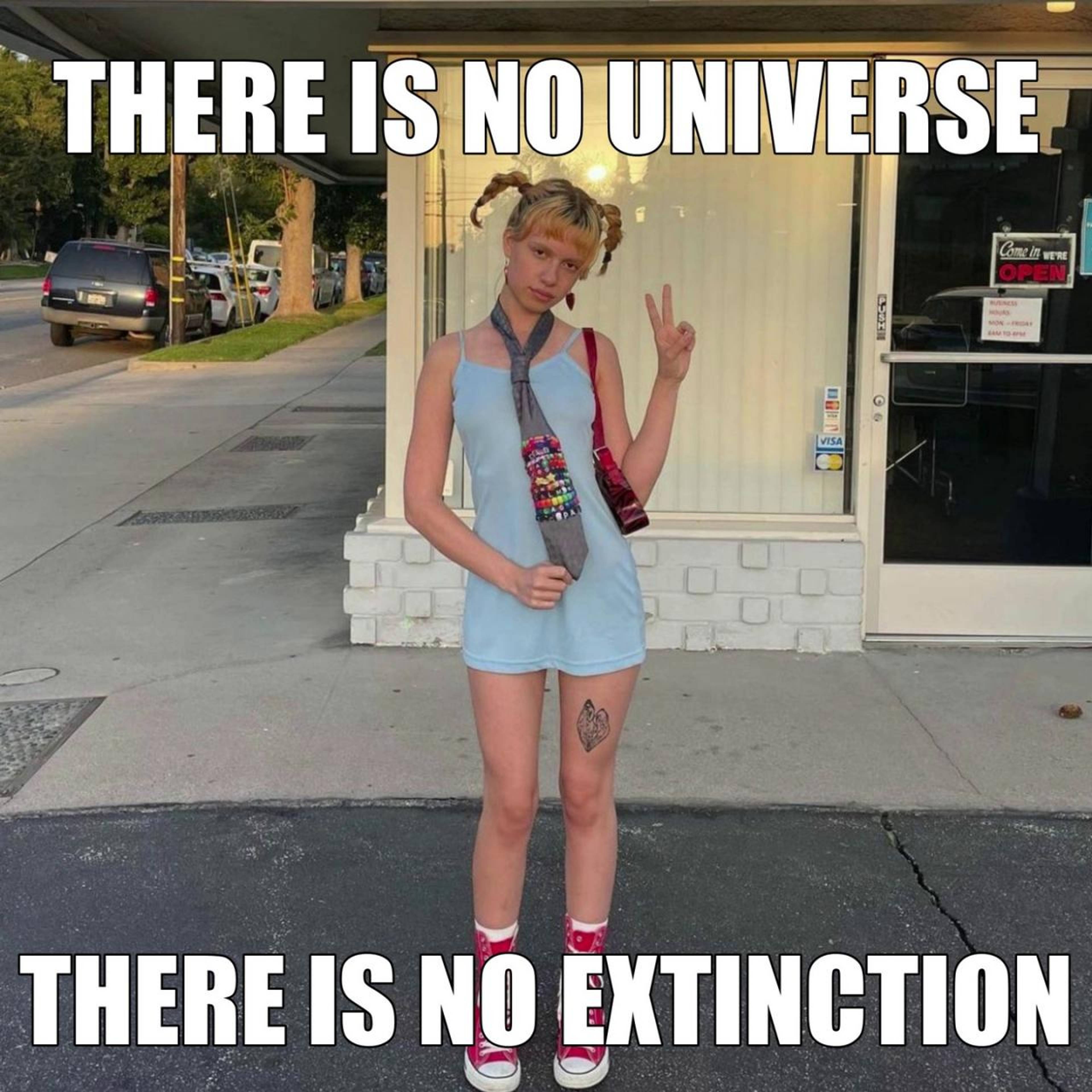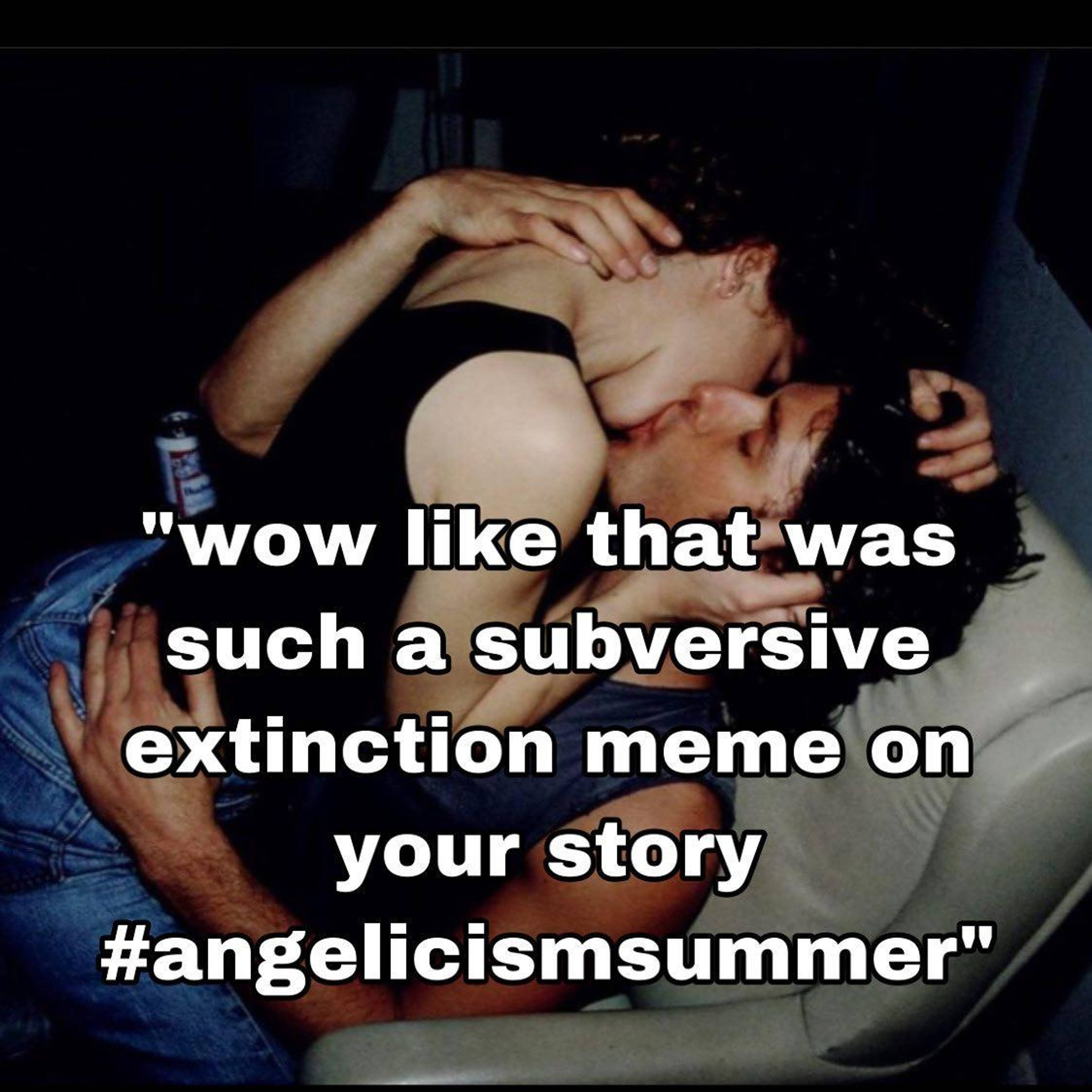I met a girl at a party in Manhattan right before the pandemic. She was dancing in a hollowed-out office building in Herald Square, the last tenant of which was apparently something called “VR WORLD,” if all the residual signage was to be believed. She makes YouTube vlogs, I later learned, and I will shamelessly divulge that I am her #1 viewer. One night, lying awake in a starchy hotel bed, x years and y cities of residence later, I see that she has uploaded something new, roughly the length of a network television episode, called “QUITTING YOUTUBE.” I don’t click through to watch it, but hover for a second, and see the first few seconds playing out in the thumbnail, overlaid with auto-generated captions: “I just got back from a particularly radicalizing extinction rebellion protest…” Move my cursor from the thumbnail and it stops playing. Roll over it again and the captions restart, fitfully, breaking sentences at awkward intervals. The words materialize as:
I just got
back
from a
particularly rad-
icalizing
extinction.
Photo: Adina Glickstein
I’m on vacation in the south of Portugal. Here, the rocks are deep red and jut straight up from the roadside, perfectly perpendicular, just like where I grew up in the US Southwest. Unlike there, they descend here into the Atlantic Ocean, lapped in the breeze by cerulean water. For some reason I can’t relax. At first, I think I’m having an autoimmune response to stopping-working. Without the regular outlets for offloading energy, I’m fidgety, nauseous. When the anxiety refuses to abate, I self-diagnose myself with internet poisoning. Across my feeds and my beach reads, an ugly word keeps surfacing. Recency illusion, Baader-Meinhof effect, or actual omen? Recurring like an incantation: Extinction extinction extinction extinction extinction.
The next flare-up was innocent enough, sitting by the pool with Peli Grietzer’s Amerrikkkkka, published through the online small press Gauss PDF in 2014. It hinges on this cheap device — compiling Grietzer’s writing from elsewhere and gluing it all together with a recurring bit lifted from The Simpsons, and I said to Mabel, I said… — which should get annoying but doesn’t, a testament to how perfect the writing is. The meat of the book oscillates between class-conscious readings of Vampire Weekend lyrics, dating stories, and attempts towards a mathematical “theory of vibe” (for instance). All of this said and done before words like “vibe” and “extinction” went into overdrive, losing their meaning through ceaseless repetition.
The arms race to out-avant-garde one another on the internet has led to this nosedive, suspended in extinction’s slow unfolding.
Leafing through Amerrikkkkka on my cheapo e-reader, I’m arrested by a passage that really fucking presciently captures the mood du jour, the impetus behind the kind of nihilistic “schizoposting” that certain online subcultures are collapsing into: “And I said, I said ‘imminent extinction can be kind of exhilarating. Isn’t it good to know the work you do now will never not-be-on-the-cutting-edge?’” On my Twitter feed, takes to that effect, but a lot more nonsense-y, spring up and evaporate hourly. The examples are too many, and often too short-lived to tally, but the gist is that the “e” in “e-girl” now stands for “extinction.” One of the countless angelicism01 clone accounts proposes, for instance, that “extinction is lowkey life affirming.” Stuff to that effect, all over, everywhere. Eight years after Amerikkkkka and the closest thing to a new “cutting edge” is a cloud of personalities and signifiers, some self-admittedly reactionary, grouped under lazy mantles like “vibe shift” and “alt lit revival.” Probably it’s my fault for following the wrong accounts in the first place, but if reportage on this, uh, scene is still getting greenlit in the, ahem, legacy media, then I can deduce it’s a collective fixation, algorithmically-engendered, if not driven by something as boring and obvious as the fact that transgression is inherently seductive.
The arms race to out-avant-garde one another on the internet has led to this nosedive, suspended in extinction’s slow unfolding. Grietzer is a way better writer than Angelicism, and certainly one with better politics, but he got displaced as the cutting-edgiest by a wave of cultural production more shamelessly hell-bent on acceleration: frenetic TikToks and hyperverbose Substacks. Bataille 101: there’s a libidinal pull to the Thirst for Annihilation. Gauss PDF shut down this May, after publishing 300 “ambient” texts online for free — a kind of literary experimentalism that set the groundwork for the present landscape but feels so pleasant in comparison that it’s almost quaint, or virtuous.
Everything good that’s written today is written on and for the internet, and everything good that’s been written previously is available there, too. That’s the premise behind K. Allado McDowell’s new book Amor Cringe, a novella about an electronic musician living in the basement of a TikTok hype house. It was co-written with the AI text-generator GPT-3, and it reads like the internet speaking to itself, which, technically, it kind of is. Like Grietzer, McDowell is concerned with vibes, and whether they’re reducible to computational models or instead represent some excess, some freedom beyond the grasp of the machine. So Amor Cringe puts the limits of mechanical affect-distillation to the test with a self-proclaimed “experiment in cringe maximization.” It contains passages like:
“‘Let’s tear the whole block down,’ Jordice [one of the TikTok teens] said, suddenly excited. ‘But, like, in a post-Kaczynski, invasive cosmetic feral chimera RNA virus kind of way.’ Briden [another of the TikTok teens] smirked, ‘Yeah, bro. The only way to get the neighborhood carbon-neutral is to incinerate it in an eschatological ultraviolent teleological gamer-pilled basilisk event horizon.’”
I read it on my flight back to Berlin, all in one go. At the end, the narrator finds God.
Meme reworked by the author
A friend in town for the weekend points out that the cool kids in New York are dressing like duck hunters now. I explain this to my mom, who, for decades, conducted market research for the outdoor retail chain Bass Pro Shops. Together, we lament that she no longer has the employee discount. Utility vests and shield sunglasses and tactical camouflage. It’s all giving “prepper,” fitting for the millenarian spirit — and reactionary flavor — of the times.
I think the balance is shifting, though. Schizoposting is getting stale, overexposed. No one wants to read another “vibe shift” take from the legacy mags, let alone this one. Barrett Avner from Contain wrote a great geneaology of the schizopost on Substack, calling it a failed aesthetic redirect that materialized as a way of skirting the ridiculous culture wars of the Trump years. Now, it’s a vestige, which, as them whispers about Thiel bucks reverberating around the “downtown podcast scene” remind, has been recaptured a little too eagerly by capital. The uptick in extinction talk piquing my perception was, I now hope, itself an extinction burst , a last-resort flare-up as that sentiment starts to vacate the system. The end of this particular fixation on “the end.” Like a psycho-spiritual case of the retinol uglies, splashed across the visage of the egregore.
Other, more promising cultural forms than terminally-online nihilism are certainly being rehearsed. I don’t know if they constitute the “cutting edge.” But I’m willing to concede that some values — joy, solidarity, spontaneity — outweigh the pursuit of novelty, which quickly begets the pursuit of edginess, in the recipe for a meaningful avant-garde.
Photo: Adina Glickstein
I hit the road again for the opening of documenta fifteen, where many such forms are being tried out, with varying degrees of efficacy, bearing variously strong resemblances to good old relational aesthetics. My first night in Kassel, the murmur of extinction was abated, for a second, as someone sang karaoke to Frankie Valli and I ate pizza that someone else paid for. The galleries were replete with murals and many, many mind-maps. An indoor skate park, which sort of felt like a Silicon Valley startup campus, but more whimsical. Santa’s workshop meets protest-rave. Salami in the gift shop packaged to match this year’s exhibition’s brand identity. Kristian Vistrup Madsen said the whole thing had “Steiner School vibes.” I live for it! The prevailing themes of this edition seemed to be 1) resource sharing and 2) literally just hanging out, which strike me as useful conditions for gestating new cultural possibilities. A pleasant, if limited, rejoinder to the precarious state of being which strips imaginative faculties in the neolib status quo.
There was a performance by Black Quantum Futurism, the duo project by Moor Mother and Rasheedah Phillips, on a platform in the middle of the river that bisects the city, and I watched it, sleepy and receptive, grateful for a different formulation of possible futures — one with beauty and rigor and pointed critical resolve. There was the inaugural assembly of something called “BeeDAO,” which I spent fifty euros to enter. We voted on initiatives to fund local beekeepers. It was not particularly decentralized, autonomous, or organized, for that matter, but we got local honey and nice t-shirts. It called to mind the original extinction-anxiety meme, that “the bees are dying at an alarming rate.” Maybe we slowed their endangerment? There was a film by Hito Steyerl about the “internet of cheese,” and an adjacent cheese pavilion, tucked in a courtyard presided over by a jolly gardener. There was conviviality, and there were cold drinks. Utopia it was not; neither was it an eschatological ultraviolent teleological gamer-pilled basilisk event horizon. God, it was so intolerably hot that weekend, and then, again this past one. I asked a friend if this was how things would always be, now, thanks to climate change, or whatever, and he said, yeah, probably.
Extinction meme via @beautyisdecay on Instagram






